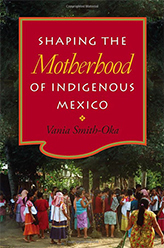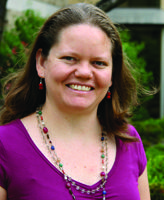
In her groundbreaking new book, Shaping the Motherhood of Indigenous Mexico (Vanderbilt University Press, 2013), Notre Dame anthropologist Vania Smith-Oka examines the impact of the widely praised Mexican cash-transfer program Oportunidades on women in the country’s marginalized indigenous communities.
“I unpack the various layers that shape these women’s motherhood,” says Smith-Oka, an assistant professor in the Department of Anthropology and faculty fellow in the Kellogg Institute for International Studies. “The book asks if a woman can follow indigenous mothering and still be considered a ‘good mother.’”
Linda Whiteford, professor of anthropology at the University of South Florida, says “the book shows both the intended and unintended consequences of development policy.” Whitefold was one of several experts who spoke at the book’s launch earlier this fall.
Oportunidades is a Mexican government program designed to help alleviate, and eventually eradicate, extreme poverty in that country. More than a fifth of the Mexican population is enrolled in the program, which provides cash stipends to women in exchange for their meeting government-specified goals with regard to their children’s health, nutrition, and education.
While Oportunidades has been acclaimed around the world for its success in addressing income inequality and human development, Smith-Oka takes a more critical lens to the program, examining its implementation up close, particularly in regard to its impact on Mexico’s already marginalized indigenous women.
 Vania Smith-Oka
Vania Smith-Oka
“Indigenous mothers are considered problematic in Mexico,” she says, explaining that indigenous women often have trouble adjusting to the cultural norms implicit in the program requirements of Oportunidades.
In her research in northern Veracruz, Mexico, Smith-Oka found that the program’s conditions are strictly enforced. Teachers and doctors monitor the mothers’ compliance with the program’s three areas of focus: health, nutrition, and education. Any women found to be deviating from the program can be cut off from the bi-monthly cash transfers, which for many women represents up to 60% of their income.
But besides the monetary threats, there is the social chastisement that comes with the everyday application of the program. The mothers are often berated by clinicians for having too many children and for other examples of their “backward” ways and made to “question their role as mothers,” says Smith-Oka.
When she first started her research in 2004, Smith-Oka found that indigenous mothers often felt stuck in a “limbo between traditional medical care and biomedicine—people were suspicious of both.” Changes in beliefs about health, as well the impact of emigration, were beginning to impact the daily lives of indigenous people in Mexico.
The book has already won acclaim for its examination of important aspects of conditional cash transfer programs.
According to Whiteford, the book shows “how well-meaning policies get translated into blaming women.”
“We are beginning to ask questions we have never asked before,” says Anthropology Professor and Kellogg Faculty Fellow Carolyn Nordstrom, who moderated the book launch. She calls the work an important contribution to understanding how national-level decisions shape people’s lives on a day-to-day basis.
“Smith-Oka is part of a group of exciting young scholars seeking to challenge our assumptions about women in rural Latin America,” adds Gabriela Soto Laveaga, associate professor of history at the University of California, Santa Barbara. “[This book] is a page-turner, which one does not say often of academic books.”
Learn More >
- Vania Smith-Oka faculty page
- Department of Anthropology
- Kellogg Institute
- Shaping the Motherhood of Indigenous Mexico
Originally published at Kellogg.nd.edu


